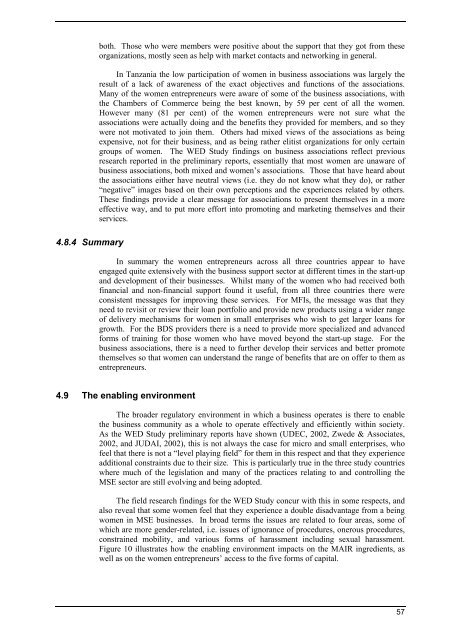The Challenges of Growing Small Businesses - International Labour ...
The Challenges of Growing Small Businesses - International Labour ...
The Challenges of Growing Small Businesses - International Labour ...
You also want an ePaper? Increase the reach of your titles
YUMPU automatically turns print PDFs into web optimized ePapers that Google loves.
oth. Those who were members were positive about the support that they got from these<br />
organizations, mostly seen as help with market contacts and networking in general.<br />
In Tanzania the low participation <strong>of</strong> women in business associations was largely the<br />
result <strong>of</strong> a lack <strong>of</strong> awareness <strong>of</strong> the exact objectives and functions <strong>of</strong> the associations.<br />
Many <strong>of</strong> the women entrepreneurs were aware <strong>of</strong> some <strong>of</strong> the business associations, with<br />
the Chambers <strong>of</strong> Commerce being the best known, by 59 per cent <strong>of</strong> all the women.<br />
However many (81 per cent) <strong>of</strong> the women entrepreneurs were not sure what the<br />
associations were actually doing and the benefits they provided for members, and so they<br />
were not motivated to join them. Others had mixed views <strong>of</strong> the associations as being<br />
expensive, not for their business, and as being rather elitist organizations for only certain<br />
groups <strong>of</strong> women. <strong>The</strong> WED Study findings on business associations reflect previous<br />
research reported in the preliminary reports, essentially that most women are unaware <strong>of</strong><br />
business associations, both mixed and women’s associations. Those that have heard about<br />
the associations either have neutral views (i.e. they do not know what they do), or rather<br />
“negative” images based on their own perceptions and the experiences related by others.<br />
<strong>The</strong>se findings provide a clear message for associations to present themselves in a more<br />
effective way, and to put more effort into promoting and marketing themselves and their<br />
services.<br />
4.8.4 Summary<br />
In summary the women entrepreneurs across all three countries appear to have<br />
engaged quite extensively with the business support sector at different times in the start-up<br />
and development <strong>of</strong> their businesses. Whilst many <strong>of</strong> the women who had received both<br />
financial and non-financial support found it useful, from all three countries there were<br />
consistent messages for improving these services. For MFIs, the message was that they<br />
need to revisit or review their loan portfolio and provide new products using a wider range<br />
<strong>of</strong> delivery mechanisms for women in small enterprises who wish to get larger loans for<br />
growth. For the BDS providers there is a need to provide more specialized and advanced<br />
forms <strong>of</strong> training for those women who have moved beyond the start-up stage. For the<br />
business associations, there is a need to further develop their services and better promote<br />
themselves so that women can understand the range <strong>of</strong> benefits that are on <strong>of</strong>fer to them as<br />
entrepreneurs.<br />
4.9 <strong>The</strong> enabling environment<br />
<strong>The</strong> broader regulatory environment in which a business operates is there to enable<br />
the business community as a whole to operate effectively and efficiently within society.<br />
As the WED Study preliminary reports have shown (UDEC, 2002, Zwede & Associates,<br />
2002, and JUDAI, 2002), this is not always the case for micro and small enterprises, who<br />
feel that there is not a “level playing field” for them in this respect and that they experience<br />
additional constraints due to their size. This is particularly true in the three study countries<br />
where much <strong>of</strong> the legislation and many <strong>of</strong> the practices relating to and controlling the<br />
MSE sector are still evolving and being adopted.<br />
<strong>The</strong> field research findings for the WED Study concur with this in some respects, and<br />
also reveal that some women feel that they experience a double disadvantage from a being<br />
women in MSE businesses. In broad terms the issues are related to four areas, some <strong>of</strong><br />
which are more gender-related, i.e. issues <strong>of</strong> ignorance <strong>of</strong> procedures, onerous procedures,<br />
constrained mobility, and various forms <strong>of</strong> harassment including sexual harassment.<br />
Figure 10 illustrates how the enabling environment impacts on the MAIR ingredients, as<br />
well as on the women entrepreneurs’ access to the five forms <strong>of</strong> capital.<br />
57
















